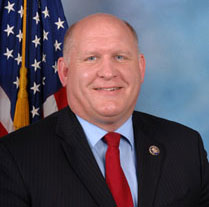“We must continue to advocate for increased local control, providing for academic standards set by states, school boards and local educators, and putting a stop to coercive mandates from Washington. . . ” – U.S. Rep. Glenn ‘GT’ Thompson
 BELLEFONTE – U.S. Rep. Glenn ‘GT’ Thompson, R-Howard, has voted to support H.R. 5, the Student Success Act, which would reform and reauthorize the Elementary and Secondary Education Act (ESEA), also known as No Child Left Behind (NCLB). The measure passed by a vote of 221-207.
BELLEFONTE – U.S. Rep. Glenn ‘GT’ Thompson, R-Howard, has voted to support H.R. 5, the Student Success Act, which would reform and reauthorize the Elementary and Secondary Education Act (ESEA), also known as No Child Left Behind (NCLB). The measure passed by a vote of 221-207.
“There is widespread agreement that No Child Left Behind is not adequately serving the needs of our children and should be drastically overhauled,” stated Thompson.
“While this bill is far from perfect, it is the first step forward in the legislative process to improve elementary and secondary education.
“I believe that we must continue to advocate for increased local control, providing for academic standards set by states, school boards, and local educators, and putting a stop to coercive mandates from Washington.
“No Child Left Behind has taken great teachers and turned them into test proctors.
We must remove the federal barriers that tie their hands, preventing them from truly facilitating an environment where they can help guide a student on a path to achieving his or her full potential.
“We must also empower parents to take a greater role in their child’s learning. Too often parental involvement in school tapers off after the elementary level we must get parents out of the bleachers and back in the classroom.”
“If we follow these guiding principles, we can create an environment where schools can be a transformative place for our children,” added Thompson.
Highlights of the Student Success Act (H.R. 5):
- Eliminates Average Yearly Progress (AYP) and replaces it with state-determined accountability systems, thereby returning authority for measuring student performance to states and school districts.
- Includes language based on a proposal sponsored by Thompson, “The Education for Tomorrow’s Jobs Act,” which would provide new flexibility for school districts to integrate academic and technical instruction, and encourage the creation of educational partnerships among school districts, institutes of higher education, local industry, and other stakeholders.
- Promotes family engagement, policies that Thompson has advocated for, that will result in more parental engagement in education policies and programs at both the individual school and local school district levels, increasing the capacity of high-need districts and schools for family-school partnerships.
- Repeals federal “Highly Qualified Teacher” requirements and directs states and school districts to develop teacher evaluation systems that measure an educator’s influence on student learning.
- Protects state and local autonomy over decisions in the classroom by limiting the authority of the U.S. Secretary of Education to influence state decisions to adopt common standards or assessments.
- Streamlines data reporting, including data on student achievement and high school graduation rates, to ensure meaningful information is easily available to parents.
Thompson is a member of the House Committee on Education & the Workforce and also serves as the co-chairman of the bipartisan Career and Technical Education Caucus.


